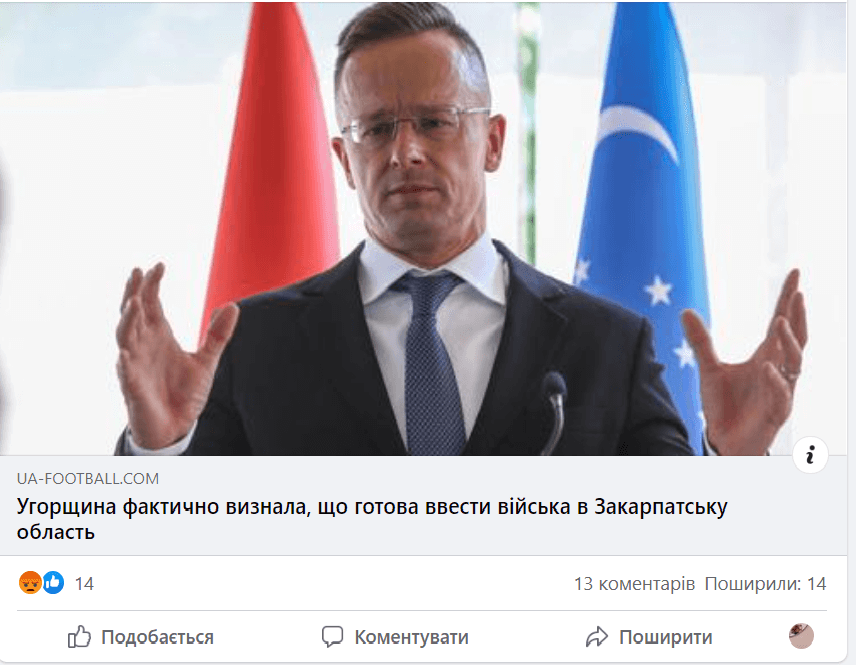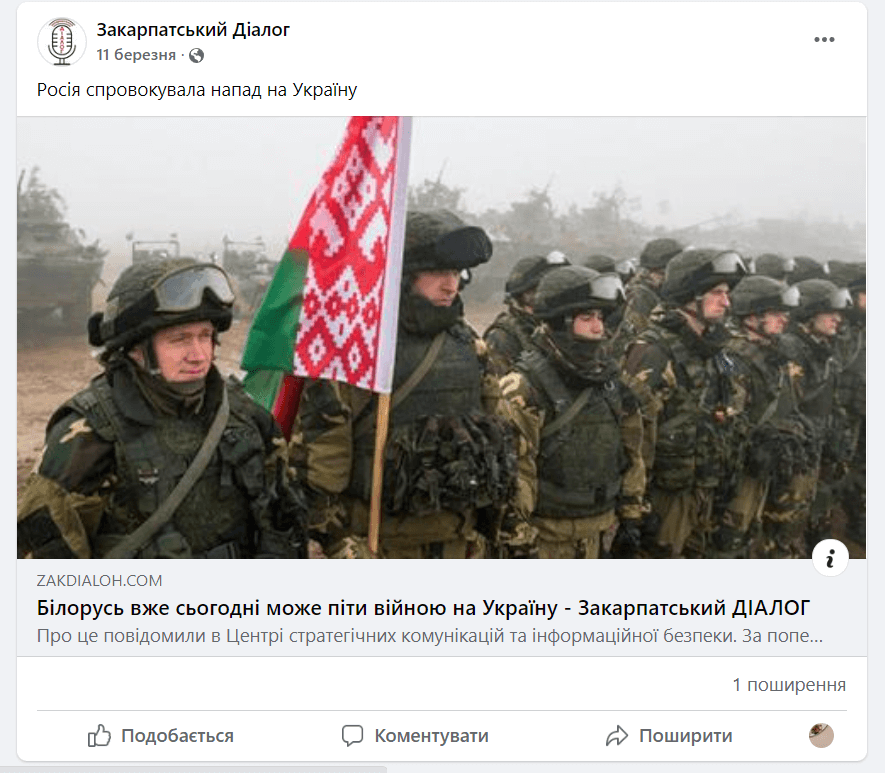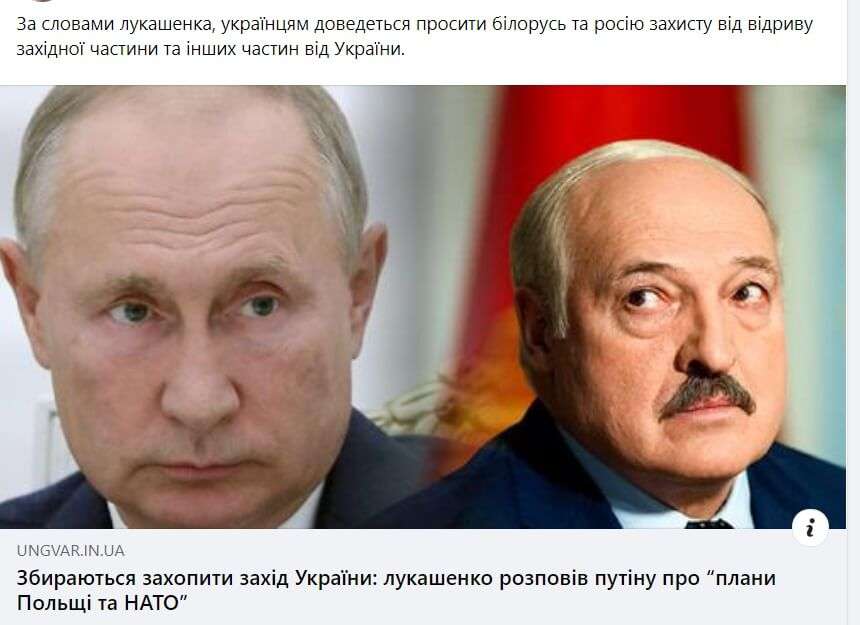Amidst the war with russia, which has been ongoing since 2014, the spread of the enemy state’s propaganda messages in the Ukrainian media space is nothing new. However, followig the aggressor’s full-scale invasion, the amount of various fakes thrown into the information space by the enemy has increased. They have also grown more visible in local social media groups. In particular, on Facebook and Telegram. We attempted to record and briefly describe exactly what kind of russian propaganda messages and fakes have been spreading in the Zakarpattia segment of social networks and what the majority of them was about.
Many fakes and messages spread by russian propaganda in local groups of Zakarpattia were related to Ukrainian-Hungarian relations. Sometimes these fakes spilled out from social media to the pages of local media outlets, which mostly exist in the format of online newspapers. For example, even at the beginning of the full-scale attack on the country, fake news about a so-called “referendum on the separation of Transcarpathia from Ukraine,” which Hungary was allegedly planning to hold, was being spread in Zakarpattia. In these fake messages, neither the exact nor the approximate date of the supposed referendum on the accession of Transcarpathia to neighboring Hungary was reported, nor any other details about the conditions on which this “event” is to take place. The fake about the so-called accession was quickly debunked in the local office of the Security Service of Ukraine. The organization “Democratic Union of Hungarians in Ukraine” also denied this information. They assured the public that the majority of Transcarpathian Hungarians had supported the independence of Ukraine in 1991, and in this difficult time, their public associations unanimously supported the country’s territorial integrity and sovereignty. “Representatives of the Hungarian community, both in the past and in the present difficult times, stand in full solidarity with the Ukrainian nation in all its efforts aimed at building an independent and democratic Ukraine,” the Union said.
The message about Zakarpattia becoming a part of Hungary is not new. It has been appearing in the media every now and then since 2014, when Crimea and parts of the Donetsk and Luhansk regions were occupied. By spreading such information, russian propaganda seems to be trying to show that Ukraine will not remain indivisible, because different parts of it will eventually go to other countries. Propagandists are spreading a similar message about Poland, which allegedly wants to take away other western regions of Ukraine, namely Lviv oblast. russia is trying to justify its attack on an independent and sovereign country by pretending to see a threat to Ukraine coming from other states.
Also, the Zakarpattia segment of social media saw a fake about the Ukrainian authorities allegedly planning to mass draft Transcarpathian Hungarians into the UAF, and Hungary being about to pay them compensation for this. The same information was sent to the local media’s editorial inboxes. The emails were signed by the Society of Hungarian Culture of Zakarpattia (SHCZ). They said that the Hungarian government would allegedly provide material assistance to “the Transcarpathian Hungarians who have been forcibly drafted into the Ukrainian army.” However, as it turned out, the Society of Hungarian Culture did not send such letters to the media nor spread such information on any other platforms. The SHCZ press office promptly responded to the fake, stating that “the provocative information was sent from an email address similar to that of the Society, but registered under a different domain name.”

Screenshot of a post in Khust Facebook group
In addition to the obvious fakes about Hungary and Ukrainian-Hungarian relations, which have been refuted by official institutions, local Facebook groups, for example Khust, saw a surge of messages about “Hungary effectively admitting its readines to send troops to Zakarpattia oblast” and other similar statements, following the statements of Hungarian high-ranking officials. Those messages arose as a reaction to Peter Szijjartо’s statement about the Hungarian government’s intent to protect ethnic Hungarians living in the territory of Ukrainian Zakarpattia in case russia’s armed aggression reaches this region. In many posts, these words were regarded almost as a “plan of attack” on Zakarpattia. Such messages, we can assume, are aimed at intimidating the local population and convincing them that the lies are true: that Ukraine as a state may soon cease to exist, and Hungary is going to seize Zakarpattia.
Transcarpathians in local groups were being threatened with “an even bigger war,” not only in when it comes to Hungary, but also with regards to Belarus. For example, messages such as “Belarus may attack Ukraine today” or “Belarus is actively preparing to attack Ukraine” were being spread around. Such theses about Belarus attacking “immediately” have been seen more than once, and each time the date of the offensive varied. We can assume that russian propagandists need these messages to spread panic among Ukrainians and make them question the competence of the Ukrainian authorities. Theses about an inevitable Belarusian offensive were being spread not only in Zakarpattia groups: from time to time they can also be seen in the Volyn segment of Facebook and Telegram. The Brekhunets project fact-checkers write about this, in particular.

Screenshot of a post from Khust Facebook group
Local groups have been mentioning Belarus and its self-proclaimed president Aliaxandr Lukashenka in a different context as well. For example, they cited his statements regarding the ominous “plans of NATO and Poland,” referring also to putin’s words. Such statements about the “dangerous West” are likely useful for russian propaganda to discredit Ukraine’s allies in the russian-Ukrainian war and make it seem like the West has its own interests in Ukraine and does not actually support it.
In addition to the mentioned fakes and messages, a trend of posting debunkings from various fact-checking organizations has become noticeable in local groups over five months into the full-scale war in Ukraine. The fakes refuted had not been previously spread in those groups directly as lies. That is, in other words, the fake itself first appeared in the Zakarpattia social media segment as already debunked. This trend only reinforces the thesis that the war has generally strengthened people’s willingness to verify information and share reliable facts.
According to our observations, from the first day of the russian full-scale invasion, the Ukrainian radio and TV airwaves, as well as on the state authorities’ pages have been saying that the people should only trust official sources and not believe the information coming from dubious sources.

Screenshot of a post from Berehovo Facebook group
In these stressful conditions, even the people who live in places with no hostilities currently ongoing have become more hungry for information and at the same time more meticulous in their analysis. Critical thinking did ot immediately switch on in all people in the country. Of course, citizens do believe some fakes and manipulations. However, we feel that many people have a desire to check what is fake news and what is not. One gets the impression that awareness of the ongoing information war has started reaching the masses. For example, even older people have learned the word “fake” because the mass media are talking about them, namely on Ukrainian radio, which speaks to the whole country.
Therefore, we can conclude that in the conditions of the current war, the importance of observing information hygiene, namely through fact checking and consuming content from reliable sources, has increased manyfold. After all, as we can see, fake news and disinformation have already become a component of the real war of aggression against Ukraine. In which Ukraine will undoubtedly win. Victory must be achieved in the information war first of all, and in this battle, unlike in military confrontations, every consumer of information can take part.
Yaroslav Hulan, regional representative of the Institute of Mass Information in Zakarpattia oblast